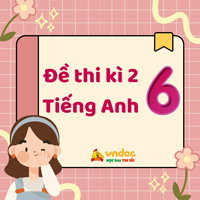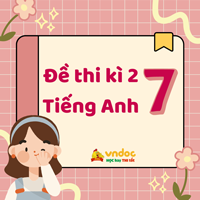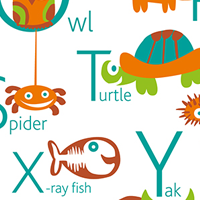Bài tập tự luận tiếng Anh lớp 11 Unit 4 Volunteer Work có đáp án
Bài tập tiếng Anh Unit 4 lớp 11 Volunteer Work có đáp án
Với môn tiếng Anh, các em cần phải chuyên cần luyện tập bằng cách giải nhiều dạng bài tập thì mới tiến bộ và học tốt môn ngoại ngữ này. Để giúp các em có thêm nhiều dạng bài tập tiếng Anh lớp 11 hay, chúng tôi đã tổng hợp và gửi đến các em Bài tập tự luận Tiếng Anh lớp 11 Unit 4: Volunteer Work có đáp án. Đáp án được viết kèm theo sau mỗi câu bài tập. Mời các em tham khảo.
* Xem thêm Hướng dẫn học Unit 4 SGK tiếng Anh 11 tại:
Soạn Unit 4 lớp 11 Volunteer work
I. Rewrite the sentences beginning with an appropriate participle (present, past or perfect).
1. When she saw the dog coming towards her, she quickly crossed the road.
________________________________________________
2. If it is looked after carefully, the plant can live through the winter.
________________________________________________
3. As I don't have a credit card, I found it difficult to book an airline ticket over the phone.
________________________________________________
4. Keith spent a lot of time filling in job application forms because he was unemployed.
________________________________________________
5. Because I was walking quickly, I soon caught up with her.
________________________________________________
6. The house was built of wood, so it was clearly a fire risk.
________________________________________________
7. I was eager to catch the bus in good time because I had been told off the day before for arriving late.
________________________________________________
8. She didn't know where the theater was, so she asked for directions at the hotel reception.
________________________________________________
9. As she was a nurse, she knew what to do after the accident.
________________________________________________
10. He had spent his childhood in Oslo so he knew the city well.
________________________________________________
11. The fruit was expensive because it was imported.
________________________________________________
12. We has spent nearly all our money so we couldn't afford to stay at a hotel.
________________________________________________
13. As we didn't want to offend him, we said nothing about his paintings.
________________________________________________
14. Although James is known mainly as a writer of novel, he has now written a successful biography.
________________________________________________
15. Although it had been hunted close to extinction, the rhino is once again common in this area.
________________________________________________
II. Complete the sentences with the correct form of the verbs in brackets.
1. The missing children were last seen (play) ______ near the river.
2. (complete) ______ the book, he had a holiday.
3. (find) ______only in the Andes, the plant is used by local people to treat skin diseases.
4. The accident seems to (happen) ______ at around 1. 00 p. m yesterday.
5. Do something! Don't just sit there (twiddle) ______ your thumbs.
6. Last year I studied abroad. I appreciate (have) ______the opportunity to live and study in a foreign country. .
7. (look) ______down from the hill, the town spread out before us towards the coast.
8. Marta doesn't like to have her picture (take) ______. She avoids (photograph) ______.
9. I don't agree with (smack) ______ children if they do something wrong.
10. The book (publish) ______ last week is his first novel.
11. (photocopy) ______ all the papers, Sarah put them back in the file.
12. I found a coin (lie) ______on the sidewalk.
13. Our mechanic said that he expects to (fix) ______ the brake on the car before we pick it up.
14. Life must be unpleasant for people (live) ______ near busy airports.
15. (park) ______ the car about a kilometre from the stadium, I walked the rest of the way.
III. Choose the correct alternatives. Sometimes both are possible.
1. He insisted to pay/ on paying for the meal.
2. The interviewer started off to ask/ by asking me why I wanted the job.
3. What am I going to do? I forgot bringing/ to bring my calculus text, and I need it for the review today.
4. I can clearly recall him saying/ his saying that he was meeting 'Sarah at eight o'clock.
5. Mrs Gates appreciated serving/ being served breakfast in bed when she wasn't feeling well.
6. You'd better save/ to save some money for a rainy day. You can't count on rescueing/ being rescued by your parents every time you get into financial difficult.
7. Waiting/ Having waited six months for the washing machine being delivered/ to be delivered, I decided to cancel/ cancelling the order.
8. By telephoning/ In telephoning every hour, she managed to speak/ speaking to the doctor.
9. The ticket enables you visiting/ to visit both the museum and the art gallery.
10. Watching/ Having watched television to the exclusion of all other activities is not a healthy habit for a growing child.
11. Now I remember you ask/ your asking me to bring sandwiches to the picnic. Your complains about my forgetting/ having forgotten things seem justified. I'm sorry.
12. No one could make Ted feel/ to feel afraid. He refused to intimidate/ to be intimidated by anyone.
13. The government plans to bring/ bringing in new laws forcing/ making parents to take more responsibility for the education of their children.
14. When I was in the supermarket I noticed a man to take/ take some food off the shelf and hide it inside his coat.
15. I overheard her tell/ telling Jack that she was serious ill.
IV. Complete each of these sentences with an appropriate preposition.
1. He left his job to take care _____ his sick daughter.
2. They will have the opportunity to participate actively _____ the process.
3. The government plans to set _____ a regional library system.
4. He waited until they had carried _____ his orders to the fullest.
5. I volunteered _____ service in the Air Force.
6. He is very good _____ playing games.
7. Some students volunteer to work in remote areas to provide education _____ children.
8. Have you ever taken part ____ volunteer works?
9. All the students like joining _____ the Green Saturday Movement.
10. At the end of her life she suffered ____ Alzheimer's disease.
V. Imagine you are one of the villagers. Write a letter to thank the students for what they have done. Use the cues given.
Dear Hanh and Trung,
1. I/ write/ thank/ what/ you/ do/ us/ during/ your stay/ remote village//
____________________________________________
2. We/ really/ appreciate/ precious help//
____________________________________________
3. The newly-built wooden bridge/ very/ useful/ daily transportation//
____________________________________________
4. Also/ thanks/ your one-month literacy program/ villagers/ now/ able/ read/ newspapers/ though/ some difficulty//
____________________________________________
5. Thus/ we/ extremely thankful/ these invaluable things//
____________________________________________
6. We/ wish/ good health/ great success//
____________________________________________
7. Look forward/ see/ you/ again/ next year//
____________________________________________
Sincerely yours.
VI/ Fill in each blank with one appropriate word from the box
governments | worldwide | suffered | communities | enable |
emergency | nutrition | developing | services | quality |
UNICEF means the United Nations Children's Fund. It serves children in (1) ____________ all over the world. It helps children of all races, nationalities, religions, and political systems in more than 140 (2) ____________ countries. The purpose of UNICEF is to help provide better life for children and their mothers. UNICEF gives both long-term assistance and (3) ____________ help.
UNICEF was created in 1946 to help bring food and medicine to children who (4) ____________during World War II in Europe. It began as a temporary agency, but became a permanent part of the United Nations in 1953 due to the need for its (5) ____________ around the world. UNICEF's primary concern is to help governments of developing countries improve the (6) ____________ of life for almost one billion children. UNICEF's main office is in the United Nations offices in New York City, but it also has more than 40 offices and 100 programs (7) ____________. In 1965, UNICEF won the Nobel Peace Prize for its work helping children and building brighter futures.
UNICEF works with (8) ____________ to provide three kinds of services. First, UNICEF plans and develops programs in developing countries. These programs serve the community by providing health care, information about (9) ____________, basic education, and safe water and sanitation. Then UNICEF trains people to work in these programs. UNICEF also provides supplies and equipment that (10) ____________ the programs to work.
VII. Choose the correct answer A, B, C or D
1. This scheme could be ______ for people in low incomes.
a. advantage b. advantaged c. advantageous d. disadvantaged
2. At present we are ______ an anti-drug campaign.
a. setting up b. carrying out c. taking part in d. joining with
3. They volunteer to take care of children who have been ______ by the AIDS epidemic.
a. supported b. suffered c. left d. orphaned
4. The building ______ the earthquake but then by a fire.
a. was survived - destroyed b. survived - was destroyed
c. survived - destroyed d. was survived - was destroyed
5. The new law allows school districts to spend more money on less ______ children.
a. advantageous b. disadvantageous c. advantaged d. disadvantaged
VIII. Change the following sentences into indirect English
1. “Get out of here immediately!” said the lady to the boys
2. “Please let me help you, Helen” said Bob
3. “Don’t work late at night!” the doctor said to me
4. “Why don’t we open another branch in Oxford?” the son asked
5. “Would it be OK if I changed the date of the meeting?” the secretary asked the manager.
6. The teacher said to us. “Could you rewrite your essays?”
7. “It is a good idea to stay in an English family for the summer,” said Johan to me.
8. “Please, please give me another chance!” Susan said to the foreman.
9. “Let’s change our seats!” the man said.
IX. Supply the correct form of the words in brackets
1. Martha works as a (volunteer) …………… in a hospital.
2. There are more and more (volunteer) …………… services all over the world.
3. He spent half of his childhood in an (orphan) ……………
4. The police are looking into the (appear) …………… of the (value) …………… painting.
5. Educational activities are supposed to get (parent) …………… assistance.
6. It is (thought) …………… of you to bring us souvernirs from such as faraway land.
7. Mike is (depend) ……………, so you can trust him with different jobs.
8. Paula was so angry at the meeting, and now she is (regret) ……………
9. Many natural phenomena are still (explain) ……………
10. Many government nowadays have to face serious (environment) …………… problems.
11. Sue was sacked not because of her (experience) ……………, but of her (care) …………… and (organize) ……………
12. How can he perform such a dangerous feat at (easy) ……………?
ĐÁP ÁN
I. Rewrite the sentences beginning with an appropriate participle (present, past or perfect).
1 - Seeing the dog coming towards her, she quickly crossed the road.
2 - Looked after carefully, the plant can live through the winter.
3 - Not having a credit card, I found it difficult to book an airline ticket over the phone.
4 - Being unemployed, Keith spent a lot of time filling in job application forms.
5 - Walking quickly, I soon caught up with her.
6 - Built/ Being built of wood, the house was clearly a fire risk.
7 - Having been told off the day before for arriving late, I was eager to catch the bus in good time.
8 - Not knowing where the theater was, she asked for directions at the hotel reception.
9 - Being a nurse, she knew what to do after the accident.
10 - Having spent his childhood in Oslo, he knew the city well.
11 - Being imported, the fruit was expensive.
12 - Having spent nearly all our money, we couldn't afford to stay at a hotel.
13 - Not wanting to offend him, we said nothing about his paintings.
14 - Known mainly as a writer of novel, James has now written a successful biography.
15 - Having been hunted close to extinction, the rhino is once again common in this area.
II. Complete the sentences with the correct form of the verbs in brackets.
1. The missing children were last seen (play) ____playing__ near the river.
2. (complete) ___Having completed___ the book, he had a holiday.
3. (find) ___Found___only in the Andes, the plant is used by local people to treat skin diseases.
4. The accident seems to (happen) ___have happened___ at around 1. 00 p. m yesterday.
5. Do something! Don't just sit there (twiddle) ___twiddling___ your thumbs.
6. Last year I studied abroad. I appreciate (have) ___having had___the opportunity to live and study in a foreign country. .
7. (look) ___Looking___down from the hill, the town spread out before us towards the coast.
8. Marta doesn't like to have her picture (take) __taken____. She avoids (photograph) __being photographed____.
9. I don't agree with (smack) __smacking____ children if they do something wrong.
10. The book (publish) ___published___ last week is his first novel.
11. (photocopy) ___Having photocopied___ all the papers, Sarah put them back in the file.
12. I found a coin (lie) __lying____on the sidewalk.
13. Our mechanic said that he expects to (fix) ___have fixed___ the brake on the car before we pick it up.
14. Life must be unpleasant for people (live) __living____ near busy airports.
15. (park) __Having parked/ Parking____ the car about a kilometre from the stadium, I walked the rest of the way.
III. Choose the correct alternatives. Sometimes both are possible.
1 - on paying; 2 - by asking; 3 - bringing; 4 - both; 5 - being served;
6 - save - being rescued; 7 - Having waited - to be delivered,; 8 - cancel;
9 - By telephoning - to speak; 10 - Watching; 11 - your asking - forgetting;
12 - feel - to be intimidated; 13 - to bring - forcing; 14 - take; 15 - both;
IV. Complete each of these sentences with an appropriate preposition.
1. He left his job to take care of his sick daughter.
2. They will have the opportunity to participate actively in the process.
3. The government plans to set up a regional library system.
4. He waited until they had carried out his orders to the fullest.
5. I volunteered for service in the Air Force.
6. He is very good at playing games.
7. Some students volunteer to work in remote areas to provide education for children.
8. Have you ever taken part in volunteer works?
9. All the students like joining in the Green Saturday Movement.
10. At the end of her life she suffered from Alzheimer's disease.
V. Imagine you are one of the villagers. Write a letter to thank the students for what they have done. Use the cues given.
1 - I'm writing to thank you for what you have done for us during your stay in our.
2 - We really appreciate your precious help.
3 - The newly-built wooden bridge is very useful to our daily transportation.
4 - Also, thanks to your one-month literacy program, the villagers are now able to read newspapers though with some difficulty.
5 - Thus, we're extremely thankful for these invaluable things.
6 - We wish you good health and great success.
7 - Looking forward to seeing you again next year.
VI/ Fill in each blank with one appropriate word from the box
UNICEF means the United Nations Children's Fund. It serves children in (1) communities all over the world. It helps children of all races, nationalities, religions, and political systems in more than 140 (2) developing countries. The purpose of UNICEF is to help provide better life for children and their mothers. UNICEF gives both long-term assistance and (3) emergency help.
UNICEF was created in 1946 to help bring food and medicine to children who (4) sufferred during World War II in Europe. It began as a temporary agency, but became a permanent part of the United Nations in 1953 due to the need for its (5) services around the world. UNICEF's primary concern is to help governments of developing countries improve the (6) quality of life for almost one billion children. UNICEF's main office is in the United Nations offices in New York City, but it also has more than 40 offices and 100 programs 37) worldwide. In 1965, UNICEF won the Nobel Peace Prize for its work helping children and building brighter futures.
UNICEF works with (8) governments to provide three kinds of services. First, UNICEF plans and develops programs in developing countries. These programs serve the community by providing health care, information about (9) nutrition, basic education, and safe water and sanitation. Then UNICEF trains people to work in these programs. UNICEF also provides supplies and equipment that (10) enable the programs to work.
VII. Choose the correct answer A, B, C or D
1. c | 2. b | 3. d | 4. b | 5. c |
VIII. Change the following sentences into indirect English
1. The lady told the boys to get out of there immediately
2. Bob suggested helping Helen
3. The doctor advised me not to work late at night
4. The sone suggested changing their sseats
5. The secretary opening another branch in Oxford.
6. The teacher asked us to rewrite our essays.
7. Johan advised me to stay in an English family for the summer.
8. Susan begged the foreman to give her another chance.
9. The man sugggested changing their seats.
IX. Supply the correct form of the words in brackets
1. Martha works as a (volunteer) ………volunteer…… in a hospital.
2. There are more and more (volunteer) ………voluntary…… services all over the world.
3. He spent half of his childhood in an (orphan) ……orphanage………
4. The police are looking into the (appear) ……disappearance……… of the (value) ……(in)valuable……… painting.
5. Educational activities are supposed to get (parent) ……parental……… assistance.
6. It is (thought) ……thoughtful……… of you to bring us souvernirs from such as faraway land.
7. Mike is (depend) ……dependable………, so you can trust him with different jobs.
8. Paula was so angry at the meeting, and now she is (regret) ……regretful ………
9. Many natural phenomena are still (explain) ……inexplicable………
10. Many government nowadays have to face serious (environment) ………environmental…… problems.
11. Sue was sacked not because of her (experience) ……inexxperience………, but of her (care) ……carelessness……… and (organize) …disorganization…………
12. How can he perform such a dangerous feat at (easy) ……ease………?
Trên đây là Bài tập tự luận tiếng Anh 11 Unit 4 Volunteer work có đáp án. Mời thầy cô tham khảo thêm nhiều tài liệu ôn tập Tiếng Anh lớp 11 cả năm khác như: Để học tốt Tiếng Anh lớp 11, Bài tập Tiếng Anh lớp 11 theo từng Unit trực tuyến, Đề thi học kì 1 lớp 11, Đề thi học kì 2 lớp 11,... được cập nhật liên tục trên VnDoc.com. Bên cạnh Tiếng Anh 11, các thầy cô có thể tham khảo Toán 11 và Ngữ văn 11.
Để chuẩn bị tốt cho năm học 2022 - 2023 sắp tới, mời quý thầy cô, các bậc phụ huynh và các em học sinh tham gia nhóm Facebook: Tài liệu học tập Tiếng Anh lớp 11 để tham khảo thêm nhiều tài liệu các môn học khác nhau.















